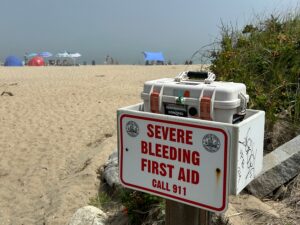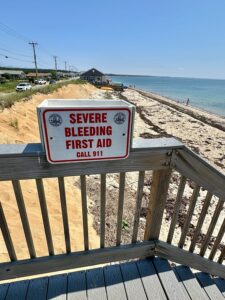TRURO — Every day, Truro’s beach attendants check the white boxes labeled “severe bleeding first aid” to make sure the bleed kits are still there. The kits are meant to save a life in case of a shark attack or other emergency. Often, though, the beach attendants find them missing.

“Hemorrhage control kits are being ransacked at the beaches,” acting Town Manager Kelly Clark said at the select board’s July 22 meeting.
The town quickly replaces whatever is found missing, but for the bleed kits to be gone — even just for a short time — means there’s a risk that if someone is injured by a shark or otherwise hurt and bleeding heavily, supplies meant to help them won’t be found.
“We are obviously concerned that people are stealing, but we’re more concerned that someone’s going to grab that kit, and there’s not going to be anything in there for them if they need it,” said Truro Fire Chief Tim Collins.
The beaches have housed bleed kits since the fall of 2018. They were installed after 26-year-old Arthur Medici, who had been boogie boarding, was bitten by a shark at Wellfleet’s Newcomb Hollow Beach. Medici was the first person on the Atlantic coast to die from shark bite injuries since 1936.
Eric Pyensen, the newest member of Truro’s beach advisory commission, said at the recent select board meeting that he had been at Newcomb Hollow that day. Pyensen said that he and a friend tried to help Medici but lacked emergency supplies.
Seeing the consequences of a shark bite up close has made Pyensen passionate about safety on the water — and disheartened by the apparent thefts. “At Ryder Beach the other day, which is one of our favorite bay beaches, the safety kit was not there, and I was pretty disappointed,” he said.
A month before Medici died, another man was bitten by a shark on the Outer Cape. That man, William Lytton, was airlifted from Longnook Beach in Truro to Tufts Medical Center in Boston, where he was treated for deep puncture wounds on his torso and leg, according to news reports at the time.

After those attacks, the Outer Cape towns and the Cape Cod National Seashore added hard-wired and satellite emergency phones at beaches, which have poor cell phone service, and started equipping them with bleed kits. Local fire departments have since held regular Stop the Bleed training to teach residents how to use the kits in an emergency.
“These kits are not first-aid kits,” Collins said. You won’t find Band-Aids in there or other equipment meant to treat minor injuries. Instead, the kits contain hemostatic dressings, gauze bandages that accelerate the body’s natural clotting process. The cases cost about $180, while the hemostatic dressings inside cost up to $125, according to Collins.
As researchers find that the population of sharks visiting the Outer Cape appears to be rebounding, shark safety is more important than ever. But the kits are also meant to help in emergencies other than shark attacks, such as a cut by a boat propeller or other injuries causing hemorrhaging.
The kits have from time to time been found open and with something missing since they were first installed. Sometimes, the kits disappear altogether. The losses are logged, but town officials do not know who has taken them or why.
And the problem continues, according to Collins. “Last week, we had three kits that were broken into,” he said.
Wellfleet Fire Chief Joseph Cappello could not be reached for an update, but Leslie Reynolds, the deputy superintendent of the National Seashore, which maintains bleed kits at Provincetown beaches, told the Independent in an email that the Park’s “stop the bleed kits have not been stolen.”
Eastham Deputy Fire Chief Eric Littman said the same was true there: “I’ve not been aware or been informed of any thefts of any equipment on our beaches.”
“I want to bring a little public awareness,” Collins said. “So, if someone sees this occurring, call us.”



